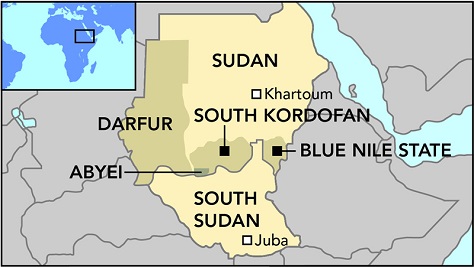 Photo credit to Ashraf Shazly/AFP/Getty Images
Photo credit to Ashraf Shazly/AFP/Getty Images
Guest post by Kevin Buettner
In the span of just a couple weeks, Africa will experience both a historic democratic transfer of power in Nigeria and the stubborn clinging to power by a dictator in Sudan, as scheduled elections begin for the first time since the largely Christian South Sudan split from the rest of the chiefly Muslim country in 2011.![]()
Sudanese president Omar al-Bashir has ruled over perhaps the most turbulent stretch of Sudan’s post-colonial existence. During the last quarter-century, Bashir watched as Sudan lost South Sudan after decades of conflict, a concurrent genocide in Darfur (for which Bashir was indicted by the International Criminal Court), and a escalating crisis in the Blue Nile and South Kordofan states in the south of the new, truncated Sudan.
The ruling National Congress Party (NCP, المؤتمر الوطني) has ensured its continued power and Bashir’s easy reelection by designating as ‘independent’ all persons running for office without the explicit consent of the NCP leadership. With strict NCP and government control over the Sudanese media, the NCP has created the perception that the opposition is disunited.
* * * * *
RELATED: Who would win a South Sudanese civil war? Khartoum.
RELATED: Pressing pause — South Sudan at a crossroads
* * * * *
Moreover, much of the Sudanese opposition is simply boycotting polls that are expected to fall well short of international standards for free and fair elections. No one expects Bashir to lose reelection, despite some of the most strident protests in recent memory in September 2013 when residents in Khartoum, the capital city, turned out to denounce price increases and the economic malaise of the 2010s, many calling on Bashir to resign. Several dissident NCP members denounced Bashir and in November 2013, Bashir dismissed his long-serving first vice president, Osman Taha, who was largely credited with working with South Sudan and the international community to enact the peace agreement that cleared the way for South Sudan’s 2011 independence referendum. Today, however, it seems clear that Bashir has widely survived the 2013 tumult.
Though Bashir rose to Sudan’s presidency for the first time in a 1989 military coup, he only truly consolidated power between 1996 and 1999, when he outmaneuvered Sudan’s behind-the-scenes leader, Islamist hardliner Hassan al-Turabi, in part due to rising US concern about Sudan’s ties to radical Islamic terrorism.
Today, Sudan’s electorate is hardly in the kind of shape to hold a robust election that meets any kind of norm of civil society. Due to the ongoing conflict in Darfur and other places, there are around 400,000 persons internally displaced persons within Sudan, and that’s not counting Sudanese refugees outside the country. Some 280,000 face extremely dire living conditions, and the UNHCR estimates that 6.9 million of Sudan’s nearly 38 million people require humanitarian assistance, all of which constitutes a massive humanitarian crisis. The Central African Republic, even in the midst of its struggle to end a period of civil war once and for all, hosts over 5,500 Sudanese refugees.
That reality forced seven constituencies within the state of South Kordofan on April 7 to postpone elections indefinitely. The elections will go on as scheduled elsewhere, but there’s a good chance that those seven constituencies will never their votes counted. Since the 2011 split with South Sudan, the state of South Kordofan produces much of Sudan’s remaining oil. Despite promises of a referendum four years ago to determine South Kordofan’s future, including the contested province of Abyei, Khartoum’s inaction has led to increasing clashes with rebels who have intermittently controlled parts of South Kordofan since 2011.
Those southern votes, however, aren’t likely to go to Bashir, who is in any event unlikely to miss a handful of votes. His main competitor, Mohamed al-Baroudi, a journalist and former culture minister, is running nominally as an independent and without an organized opposition to bolster his campaign.
Neither the United States nor the European Union EU will monitor the election, though they will be expected to deliver remarks pressuring the NCP to reform itself and Sudanese government. Hopes are low for political liberalization in Sudan, where Bashir disregarded a 2011 pledge not to run for reelection, a pledge made at the height of the ‘Arab spring’ revolts across the Middle East and North Africa. With the United States nearing an announcement to remove Cuba from the US State department’s list of ‘state sponsors of terrorism,’ Sudan will join just Syria and Iran on the terrorism blacklist.
With Bashir’s near-certain reelection, his international isolation will also continue, bringing challenges to a Sudanese economy that’s still reeling from the loss of nearly three-fourths of its oil wealth to South Sudan. Notwithstanding the lingering ICC indictment for war crimes and genocide related to Darfur, Bashir’s international misadventures will also continue to isolate Sudan.
For example, Israel maintains that Iranian arms are flowing through Sudanese ports, bound for Gaza. Uganda charges that Sudan is helping aid the Lord’s Resistance Army (LRA), which has wreaked havoc not only in Uganda but the Central African Republic, and both Congos. South Sudan, the newly formed nation that came about after the civil war in the larger Sudan, also blames Sudan for interfering and arming rebel forces in its own civil war, which rages on and has already forced its government to postpone the first South Sudanese election until at least 2017.
